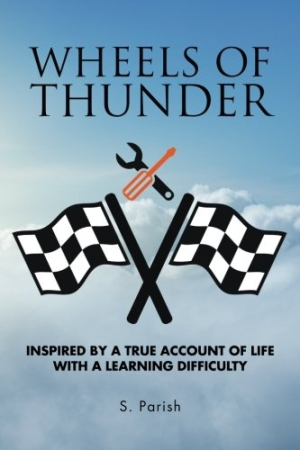Wheels of Thunder
Stuart’s voice will resonate with anyone whose life has been affected by autism spectrum disorder.
Motivated by his own love of fast driving, powerful engines, and navigating life with Asperger’s syndrome, S. Parish’s Wheels of Thunder is the story of one man’s bumpy road to success, as seen through the eyes of autism.
Twenty-one-year-old Stuart understands engines and vehicles, and is able to take them apart and put them back together with ease. People, on the other hand, are much harder for him to comprehend. Diagnosed with autism spectrum disorder, Stuart, with the help of his family, pursues his dream of competing in a championship race and maybe winning the heart of the girl next door. Amid the sleek, high-speed, precision machines dominating the British touring car championship, Stuart Robson’s pride and joy, a BMW named Thunderbolt, stands out.
Offering a unique perspective on life, Stuart’s point of view captures many of the idiosyncrasies of Asperger’s syndrome. Autism, Stuart says, “makes us able to see life, the universe, and everything else in a way that other people could only dream of.” Stuart views Asperger’s as everything from a “rare learning difficulty” to a “piece of mental software,” and even a seemingly independent entity named Sophie—“it stands for Sub Operating Physiology Highly Intelligent Engineering.” Stuart’s autism is always on the forefront of his mind, both a blessing and a curse.
Stuart’s relationships are noticeably undefined and vague, and while this makes sense within the parameters of his diagnosis, it leaves gaps in the story line. Certain peripheral characters appear and disappear randomly or are never fully introduced. Adam, for example, pops up as a “very confused twin brother,” though it’s not clear whose twin brother he is, and although Stuart mentions a brother occasionally, they never interact or converse. His love interest, next-door neighbor Emily Green, is a font of mixed signals made even more uncertain by Stuart’s own inability to read social cues.
Stuart’s most profound relationships are with his worried mother and his father, who shares his love of racing but clearly does not understand his son’s diagnosis—he refers to it initially as “a phase he’s going through.” Stuart himself struggles to understand the way his own mind works, including some mild obsessive-compulsive tendencies. He also works to overcome PTSD caused by serious bullying while in school.
These profound reflections contrast with his fast rise to fame in the racing circuit, which reads as a more fanciful and unlikely turn of events. Everything is related with the same detached, matter-of-fact tone throughout.
Wheels of Thunder explores the intricacies and emotional struggles of living with Asperger’s syndrome, and Stuart’s voice will resonate with anyone whose life has been affected by autism spectrum disorder.
Reviewed by
Pallas Gates McCorquodale
Disclosure: This article is not an endorsement, but a review. The publisher of this book provided free copies of the book and paid a small fee to have their book reviewed by a professional reviewer. Foreword Reviews and Clarion Reviews make no guarantee that the publisher will receive a positive review. Foreword Magazine, Inc. is disclosing this in accordance with the Federal Trade Commission’s 16 CFR, Part 255.

